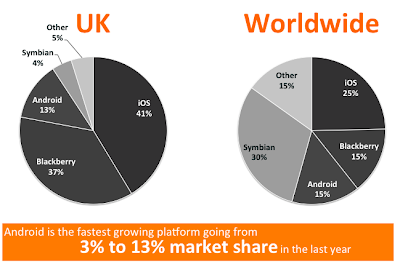We frequently get told that developing for other platforms than iOS and Android is meaningless. Many declare all other platforms dead. For the last 3 years, we’ve been told that J2ME is dead. But still in 2011, on a worldwide base, there will be more J2ME enabled devices sold than smartphones. People have also been telling us that Blackberry is a dead platform, that Microsoft has zero chance to succeed in mobile, that no one will develop apps for Palm/HP WebOS and that WAC is a failure before it has even had a chance to launch.
We believe it is very dangerous to make statements like this. The industry moves extremely quickly and there are a lot of factors involved. This is why we believe that the mobile OS battle will continue for some time:
1. The operators/carriers don’t want Apple and Google to gain complete dominance
The operator device teams at operators made it clear during conversations at Mobile World Congress that they don’t want Google or Apple to dominate completely. They will continue to back Nokia with the Windows Phone, RIM with Blackberry OS, Limo as the operator partnership and WAC as a cross-platform development platform.
2. Failing is not an option
For RIM, HP and Microsoft failing is not an option. The Blackberry OS made RIM successful and this is what lead HP to acquire Palm WebOS. Microsoft is probably the company that has the most to lose. Their strategic deal with Nokia they has proven how far they are willing to go to achieve their objectives. If RIM fail with Blackberry OS they will go down for the count as a smart phone manufacturer.
3. Device manufacturers and OS developers have deep pockets
Nokia, Samsung, RIM, HP and Microsoft all have big cash piles to execute thei mobile OS strategy. They may not get the same number of app developers to adopt their platform as Apple or Google and they may fail in the long term. However, it does mean that they can invest huge amounts of money in marketing, pay developers for app development and get big brands and services such as Facebook, Twitter, Foursquare, Google, etc. to build for their platform. They will not give up in the next 2-3 years.
4. Consumers still want choice
There is still demand for different solutions by consumers. Not only is the mobile phone a fashion statement - people want different looking phones - but there is also a demand for different screen sizes, input mechanisms and shapes. A great example is Blackberry which has continued to be very successful among business users as well as teenagers thanks to the keyboard and great messaging services.
5. Money is not everything
Having said that several of the mobile OS players have very deep pockets money is definitely not everything. Nokia allegedly spent as much money on R&D for Symbian and Qt as Apple has on R&D. Despite this they failed. At the same time Palm WebOS, which is considered one of the most advanced smartphone platforms, was developed by a small team within Palm and with the distribution of HP it might succeed.
What do we bet on for the future?
Having said that the battle will continue there is no question about who is dominating at the moment. iOS and Android are currently the platforms of choice. Other platforms are prioritized, based on promotion agreements with the device manufacturers and carriers. We believe that there are great opportunities for differentiation and distribution by embracing the full mobile ecosystem.

No comments:
Post a Comment